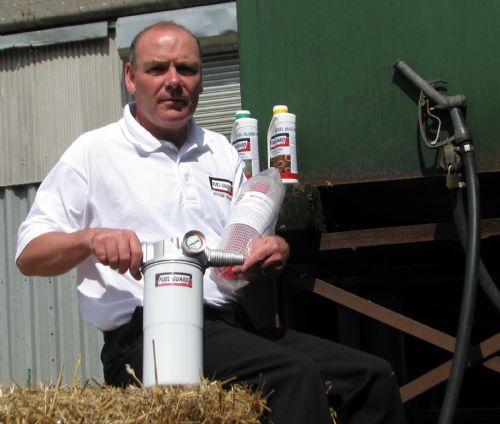
A County Durham business has been launched, to help users of red diesel keep their machinery in good order. Ian Currie of Fuel Guard, which is based at Newton Aycliffe in County Durham, will supply a number of fuel testing and problem-solving products, designed to counteract the potential negative effects of biodiesel in fuel tanks.
From the 1st January 2011, red diesel for non-road mobile machinery must contain no more than 10 milligrams of sulphur per kg of fuel. This will make the fuel virtually sulphur-free. However, sulphur-free red diesel plays an important role in the reliable operation of new, ’greener’ vehicle engines, explains Mr Currie. The change in the law, which has been introduced to comply with European Union air quality targets, is expected to reduce the storage life of untreated fuel to around six months maximum.
"The new rules mean that red diesel could contain a biodiesel level of up to 7%," he says. "With careful maintenance, most modern equipment will continue to operate effectively at this level, but users may run into problems during fuel storage. Furthermore, using the new fuel blends for older machinery may lead to damage to seals and pipework.
"Red diesel storage tanks must be monitored, because the biofuel content can increase moisture level, resulting in mould and fungal growth – known as the ’diesel bug.’ The fuel will break down more quickly, which can cause blockages in the system. If this occurs, users will have to empty and clean fuel tanks, and seek advice on how to guard against further problems."
In cases where the design of the tank makes cleaning difficult, a blockage will eventually be flushed through the system, although repeated filter changes are likely to be required in the future, adds Mr Currie, who has 25 years’ experience in the fuel, lubrication and filtration sector.
Fuel-Guard products range from testing kits, to identify the build up of solids, to specially designed filters, which will remove contaminents in fuel storage systems and machinery tanks. There is also a liquid additive treatment, for use in cases where fuel is stored over long periods
"I discovered that many of my contacts were unaware of all the problems associated with biodiesel storage," says Mr Currie. "Once I had done my research, I identified an opportunity to set up a ’one-stop shop,’ to supply products to help to keep machinery in good working order, and provide up to date information in a simplified form.
"It is early days, but I am extremely enthusiastic about the new business, and I am already thinking about expansion. I would welcome enquiries from anyone who would like to become an agent or distributor for Fuel Guard."
NOTES FOR EDITORS
Ian Currie can be contacted on 0845 6769250/07500 012217 or by email, ian.currie@fuel-guard.co.uk. More information can be found on the Fuel Guard website at www.fuel-guard.co.uk Ian is happy to answer any media enquiries on the general subject of fuel preservation and the new rules.
